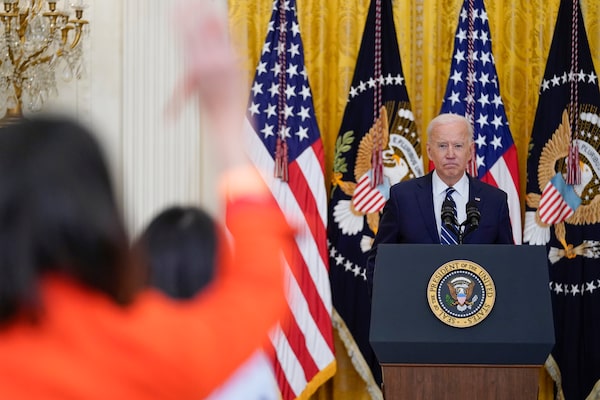
U.S. President Joe Biden speaks during a news conference in the East Room of the White House on March 25, 2021, in Washington.Evan Vucci/The Associated Press
President Joe Biden is vowing that China will never overtake the U.S. to become the world’s largest economy and reframing Washington’s showdown with Beijing as a global fight between democracy and authoritarianism.
In his first solo news conference since taking office in January, Mr. Biden on Thursday gave his strongest indication yet that he plans to continue the confrontation with China started by his predecessor, Donald Trump, who put tariffs on nearly all of the country’s goods. But unlike Mr. Trump, who mainly saw Beijing as an economic rival, Mr. Biden said the U.S. also had to stand up to China on human-rights abuses.
“China has an overall goal … to become the leading country in the world, the wealthiest country in the world, and the most powerful country in the world,” Mr. Biden told reporters at the White House. “That’s not going to happen on my watch because the United States is going to continue to grow.”
Mr. Biden said he had directly warned his Chinese counterpart, President Xi Jinping, that the U.S. would turn up the pressure over the latter’s mass incarceration of Uyghurs in the Xinjiang region and suppression of the democracy movement in Hong Kong.
“As long as you and your country continues to so blatantly violate human rights, we’re going to continue in an unrelenting way to call it to the attention of the world,” the President said he had told Mr. Xi. “He understood that.”
Mr. Xi, Mr. Biden said, “doesn’t have a democratic … bone in his body” but is a “smart, smart guy.” The U.S. President said he would thwart Mr. Xi’s plans to overtake the U.S. economically, in part through a multitrillion-dollar infrastructure spending package he is scheduled to unveil Friday.
“He’s one of the guys, like Putin, who thinks that autocracy is the wave of the future, democracy can’t function in an ever complex world,” Mr. Biden said of Mr. Xi, comparing him to Russian President Vladimir Putin.
The comments come a month after Mr. Biden promised Prime Minister Justin Trudeau that he would ensure the “safe return” of Michael Kovrig and Michael Spavor, the Canadians detained in China as apparent retaliation for Canada serving a U.S. arrest warrant on Huawei executive Meng Wanzhou. And they follow public verbal sparring over human rights between Mr. Biden’s and Mr. Xi’s top advisers at a summit in Alaska last week.
Earlier this week the Biden administration, in co-ordination with Canada and several other countries, slapped sanctions on two Chinese officials in Xinjiang.
Mr. Biden waited longer than any president in a century to give his first official presser, according to the American Presidency Project at the University of California Santa Barbara. With a history of making verbal gaffes, Mr. Biden has opted for a carefully scripted communications style.
On Thursday he had a handful of miscues, including a few non-sequiturs. But for the most part, the President projected a sombre and serious tone.
In the face of repeated questions about the country’s southern border – which has seen a surge of asylum seekers since Mr. Biden came to power promising a path to citizenship for undocumented people – he pledged that border guards would be more active on reuniting young asylum seekers with any family in the United States. Others, he said, would be moved from border stations to facilities at Fort Bliss in Texas.
Mr. Biden also used his sharpest language yet to threaten Republicans if they block his sweeping legislative agenda. Under the Senate’s rules, it takes 60 votes to end a filibuster. Because the Democrats have only 50, the Republicans could delay most legislation indefinitely. The President said he supports bringing in a rule that would allow filibusters to continue only so long as a senator continuously speaks. If that doesn’t work, he hinted he would be happy to see the filibuster done away with altogether.
“If there’s a complete lockdown and chaos as a consequence of the filibuster, then we’ll have to go beyond what I’m talking about,” he said.
Mr. Biden set a new COVID-19 target that the U.S. will have administered a total of 200 million vaccine doses by his 100th day in office, April 30. This is a doubling of the previous goal, which was reached last week.
He said all U.S. troops would be out of Afghanistan by next year.
And he took aim at efforts by Republican-run states to make it harder for Black and younger voters, who tend to favour the Democrats, to cast ballots. The President described such efforts as “un-American” and “sick,” and suggested they were even worse than segregation laws. “This makes Jim Crow look like Jim Eagle,” he said.
As for his own re-election, Mr. Biden said it was his “expectation” that he would run again in 2024, when he would be 81 years old. But he said he wasn’t entirely certain. “I have no idea if there will be a Republican Party,” he added, in apparent reference to internal divisions over Mr. Trump.
Reminded that his predecessor had himself already launched his re-election campaign shortly after first taking office, Mr. Biden laughed.
“My predecessor would need to,” he said. “Oh God, I miss him.”
Our Morning Update and Evening Update newsletters are written by Globe editors, giving you a concise summary of the day’s most important headlines. Sign up today.